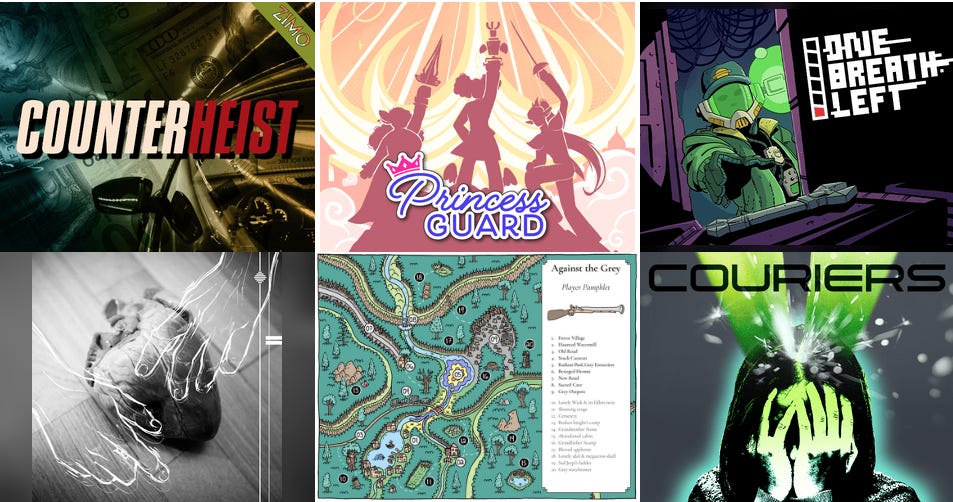I. Dear Reader,
Hope you’re having a safe week! Here is February’s round-up of new games on itch.io. These come from both browsing itch and people self-submitting their games directly to me.
Against the Grey: An adorable system-neutral adventure about anthropomorphic animals fighting to protect their forest. Has a nice form factor: one pamphlet for GMs, one for players.
Counterheist: A pseudo-competitive roleplaying game by Brendan McLeod and Matthew Guzdial where two teams of thieves play cards against each other to see who can pull off the heist first. Sounds like a quick, fun time.
Couriers: A 2-page cyberpunk game by S Dunnewold “about emotional repression, survival, and committing murder because your boss told you to.” Play till your bosses decide you need to be “retired” yourself.
Crescendo Giocoso: A collection of larps from the award-winning Italian Chamber Orchestra. Friendship, spookiness, something for everyone.
One Breath Left: A beautiful-looking game about exploring an abandoned spaceship while trying to avoid running out of oxygen. From the publisher behind Apawthecaria and others.
Princess Guard: A cute, simple game for kids of all ages by David Garett and Mocha. Comes with a series of one-page adventures.
Also, bonus game, probably my last ZineMonth shoutout, is Viva la Queerbar, a For the Queen style game where you tell the day-to-day story of running a queer space. It comes with both German and English editions and is from new indie publisher, Plotbunny Games.
Yours itch-based,
Thomas
II. Axes of Game Design (Continued)
So last week’s post was well-received. I had a lot of great conversations around it - on reddit, mastodon, the comment section here. I appreciate everyone who engaged with it. Thank you!
First, the easy one. Dan Maruschak and I workshopped something better than the Canon versus Open Setting together on mastodon. Basically, Canon versus Open feels like it’s talking about how much lore is written down in a book. Which is fiiine but extremely literal and not particularly useful for analysis. But I think it would be better to capture the players’ relationship to that lore. Is the game designed for that lore to be adhered to? Or just used as a jumping off point?
So here’s an alternate spectrum: Rigid versus Soft World. In a rigid world, the world/setting is something concrete to be learned about. In a soft world, the world/setting is something to be shaped or created. The interesting thing is that this would apply to both GMs and players here.
Another point that came up a lot was that that I was doing Simulation versus Emulation a little dirty. Clearly, there is a divide here that is apparent to a lot of people and it’s worth trying to frame that as well as possible. So this is originally how Laws and Hite phrased it:
Games that focus on Simulation resolve events as they would unfold in a causal reality, or engage in Emulation, so that events unfold as they would in a movie or book, to keep the narrative running in a satisfying manner.
But building on metaphysiocrat in the comments, I think this might be a better way of phrasing it: Internal versus External Logic. Games that focus on Internal Logic prioritize internal consistency. They rely on in-game or diagetic details to resolve questions. Games that focus on External Logic prioritize narrative suitability. They rely on meta concepts like pacing, theme and genre to resolve questions.
I think its a clearer rephrasing. It definitely stops me from being a pedantic about phrases like “causal reality” (which is a clear win). But I don’t know if it helps me place games on the spectrum though. The main challenge is that, in many trad games, the players are often made to think like they’re playing a game focused on internal logic whereas behind the scenes, the GM is completely focused on external logic. Where would we slot these games on this spectrum? One way around this is to say this is only about the stance of players. Which is fine but feels a little unsatisfying.
III. Media of the Week
The wonderful Design Doc have completed their two-part conversation on packing and shipping. It sounds so prosaic but the turtlebun folks clearly put a lot of care and thought into every aspect of their business and it shows in these episodes. They also make it clear that it’s a lot of work!
IV. Links of the Week
An excerpt from “The Time Traveller's Guide to Medieval England”, a book that seems like a great resource for folks looking for historical flavour for their games.
A review of Flabbergasted, a comedy game of fancy people getting in scrapes.
If you liked my posts about Skerples’ Magical Industrial Revolution, here’s two cool posts: one about magical medicines and one about join-stock companies.
Dr Emily Friedman is doing a large-scale academic survey of folks who make or watch/listen to actual play. It takes ten minutes and there seems to be enough responses to become something really cool.
Talking about actual play, Jeff Stormer of Party of One is now overseeing the Minnesota Web Fest’s AP category. If you make AP, might be interesting to submit your work.
A fun tutorial on how to photobash art together for your zines
V. Small Ads
All links in the newsletter are completely based on my own interest. But to help support my work, this section contains sponsored links and advertisements. If you’d like your products to appear here, read the submission form.
Nothing this week!
This newsletter is currently sponsored by the Bundle of Holding.
There’s a bundle of Arcana of the Ancients, which is Monte Cook’s Numenera setting converted for 5e.
Hello, dear readers. This newsletter is written by me, Thomas Manuel. If you’d like to support this newsletter, share it with a friend or buy one of my games from my itch store. If you’d like to say something to me, you can reply to this email or click below!




